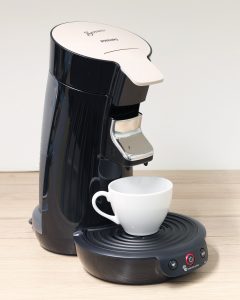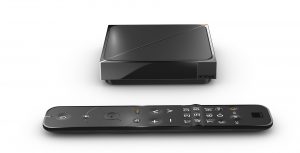More and more manufacturers are turning to „green products“. As a result, the interest of manufacturers in PCR plastics is also growing. As one of the pioneers in this field, MGG Polymers is the first point of contact for many well-known producers.
MGG Polymers used the year 2020 to reposition itself on the market. To this end, the sustainability of its own PCR plastics (post-consumer recycled plastics) was placed even more in the focus of its market presence. „We want to make our customers even more aware of the fact that we produce sustainable plastics from Waste of Electric and Electronic Equipment (WEEE) in a quality that can be reused for the production of new equipment,“ emphasises MGG Polymers Managing Director Slijkhuis. These are points that speak for MGG Polymers plastics:
- The raw materials come from the EU market.
- MGG Polymers does not use fossil raw materials in its production.
- MGG Polymers produces with green electricity from solar energy and hydropower.
- The environmentally friendly and sustainable plastics have much more stable prices than virgin plastics, which are dependent on fluctuations in the international oil market.
Some well-known producers appreciate this and use the sustainable PCR plastics to produce components for new electrical appliances. „We are pleased to note that the general public is increasingly interested in the use of PCR plastics for new e-products,“ says MGG Polymers Managing Director Chris Slijkhuis.
Right on trend
 More and more manufacturers recognize this trend. For a long time now, a catchword such as „eco“ or „environmentally friendly“ has been printed on many packaging. However, manufacturers often refer to only one aspect – for example, lower energy consumption compared to the predecessor model. The situation is completely different with the new „Senseo Viva Café ECO“ coffee machine from Philips. First of all, the product is made of over 75 percent recycled plastics. But there are also other parameters regarding energy consumption, CO2 reduction (not only by the use of PCR plastics but also by through less packaging) or durability. „We have already seen with other products that an environmentally conscious design and its implementation with PCR plastics can be realized without disadvantages and deterioration, if done well even to the contrary“ reports Chris Slijkhuis. The new Philips coffee machine won this year’s Plastics Recycling Awards Europe 2020 in the category „Automotive, Electrical or Electronic Product of the Year“
More and more manufacturers recognize this trend. For a long time now, a catchword such as „eco“ or „environmentally friendly“ has been printed on many packaging. However, manufacturers often refer to only one aspect – for example, lower energy consumption compared to the predecessor model. The situation is completely different with the new „Senseo Viva Café ECO“ coffee machine from Philips. First of all, the product is made of over 75 percent recycled plastics. But there are also other parameters regarding energy consumption, CO2 reduction (not only by the use of PCR plastics but also by through less packaging) or durability. „We have already seen with other products that an environmentally conscious design and its implementation with PCR plastics can be realized without disadvantages and deterioration, if done well even to the contrary“ reports Chris Slijkhuis. The new Philips coffee machine won this year’s Plastics Recycling Awards Europe 2020 in the category „Automotive, Electrical or Electronic Product of the Year“
From the PRSE laudation:
Philips aims to lead in large-scale implementation of post-consumer recycled plastics content in the consumer electronics industry. The introduction of the new SENSEO® Viva Café Eco represents a breakthrough for Philips and its product design teams. The SENSEO® Eco coffee maker effortlessly combines the growing need within the industry to focus on sustainable, long-term solutions, with the continued serving of the quality coffee experience that SENSEO® consumers expect and love.
Until now, most recycled plastics could be found in internal parts of appliances. The SENSEO® Viva Café Eco raises the bar with all visual plastic parts now made from recycled content, which is 75% of all the non-food contact parts weight. Next to this, the Philips design teams has developed a speckle effect with special printing techniques that enhances the appeal of the coffee maker without affecting the product’s end of use recyclability. This gives the appliance a sense of natural imperfection and environmental awareness that resonates with the consumer.
The product has been developed within the European research project PolyCE* and the recycled materials are co-developed with our suppliers MGG Polymers and Sitraplas. The quality of the circular recycled plastics is as good as virgin plastics and, as the material will become available as a standard recycled plastics grade, it allows us to expand its use in other Philips product categories.
At SENSEO® we believe that consumers shouldn’t have to choose between good tasting coffee and taking care of the environment. We are therefore committed to continue our journey in innovating for sustainability.
Big ideas for a small footprint
 A similar example is the „Livebox 5“ wireless router from Orange. Here, the carbon footprint has been reduced by 29 percent compared to the previous model, while at the same time the speed has been doubled. The reduction in the carbon footprint was also achieved by several factors: The housing was made from 100 percent recycled plastic. The product has also been designed to be lighter and more compact, allowing passive ventilation without a fan. Electronic components have generally been reduced – a fact that simplifies repairs and facilitates recycling. During the presentation of the product, Orange director Fabienne Dulac explained: „From the functions to the components and materials used, the Livebox was designed to offer the best performance while reducing the environmental impact“.
A similar example is the „Livebox 5“ wireless router from Orange. Here, the carbon footprint has been reduced by 29 percent compared to the previous model, while at the same time the speed has been doubled. The reduction in the carbon footprint was also achieved by several factors: The housing was made from 100 percent recycled plastic. The product has also been designed to be lighter and more compact, allowing passive ventilation without a fan. Electronic components have generally been reduced – a fact that simplifies repairs and facilitates recycling. During the presentation of the product, Orange director Fabienne Dulac explained: „From the functions to the components and materials used, the Livebox was designed to offer the best performance while reducing the environmental impact“.
Conclusion: „eco“ is more than just reducing energy consumption. Environmentally friendly products require a clever basic design and other accompanying measures such as the reduction of packaging materials. An increasingly important component of „eco“ products is definitely the use of PCR plastics. MGG-Polymers intends to build on the pioneering achievements of the past years and continue along this path. Managing Director Slijkhuis is convinced: „Together with the manufacturers, we can achieve a lot. We see that first-class products can be manufactured with our PCR plastics from WEEE“.
